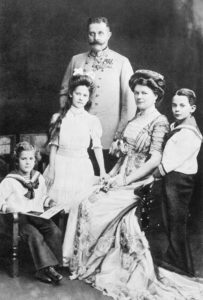1914 Archduke Ferdinand is assassinated
On June 28, 1914 a gang of teenage terrorists, set in motion by the Serbian secret police, attacked a motorcade in Sarajevo, Bosnia. After much tragicomic bungling, the heir to the throne of the Austro-Hungarian Empire, Archduke Ferdinand and his wife Sophie were murdered by the gunfire of Gavrilo Princip, a young fanatic who sought independence for Bosnia from Austria. A little over a month later, Princip’s action would result in the start of the Great War, an act, as Pope Benedict XV lamented, of civilizational suicide. Millions upon millions would die, empires would fall, new nations would arise with the basic quarrels unsettled, leading to another global war. The consequences of the deed performed by a teenager named after the archangel Gabriel had untold consequences for Christianity.
Almost immediately the war assumed the shape of a holy conflict with all sides claiming to be on the side of God (German troops wore belt buckles proclaiming “Gott Mit Uns”) and their enemies the servants of the devil. For the Turks it was an anti-Christian jihad against the French and British empires; for American evangelist Billy Sunday the struggle was “Germany against America, hell against heaven.” Germans saw themselves as beleaguered Davids surrounded by bestial Goliaths. Kaiser Wilhelm’s court chaplain preached a sermon proclaiming “We are going into battle for our culture against the uncultured, for the free German personality bound to God against the instincts of the undisciplined masses. And God will be with our just weapons! For German faith and German piety are ultimately bound up with German faith and civilization.” (Karl Barth was among the few German theologians who was appalled by such an attitude.) Meanwhile the British portrayed the Kaiser as Antichrist leading a horde of church burners and nun rapists. On the national level church leaders, aside from Quakers and Mennonites, wholeheartedly supported their countries’ participation while in the trenches, troops were told the dead were Christian martyrs and the living were crusaders.
At the war’s end, thousands of churches had been levelled, most notably St Martin’s cathedral of Ypres which became a symbol of the conflict’s destruction of civility. Thousands of priests and ministers had been killed serving as chaplains or executed by occupying powers. The faith of many was shaken by the horror of the war and returning veterans were notable for their distaste for the churches whose Sunday parades they had been forced to attend in the trenches. The Orthodox Church was shattered by the triumph of the Bolshevik Revolution. New secular messiahs were sought and found in Lenin, Hitler and Mussolini.

This inspires a disquieting sense of deja vu…
Have you read Modern Times by Paul Johnson, by the way. His chapter on Lenin and the beginning of the Soviet Union has the same effect.
I have read “Modern Times” many times and given away numerous copies. The 20th century was really one of the world’s darkest ages but Stephen Pinker (“The Better Angels of our Nature”) thinks humanity is progressing.